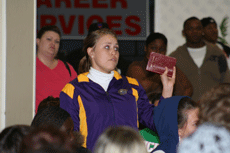In the most attended speech forum since fall 2006, supporters of teaching creationism alongside evolution in public schools and universities won 165-136 Tuesday evening in the Cotillion Ballroom. Hannah-Phyllis Urdea-Marcus, freshman from Bucharest, Romania, who spoke in favor of teaching creationism in public schools and universities, argued creationism and evolution are closely connected with science, which reinforces creationism.
Urdea-Marcus said the Bible is a compilation of orally passed stories originally written in languages the masses could not read, and while there is truth in it, Genesis spared details to achieve simplicity.
Evolution, she said, is a more accurate version of creationism.
“The Bible says there was life in water before there was life on land. Science proved life appeared on water and then on land,” Urdea-Marcus said. “Also, science and the Bible say water is the basic ingredient of life.”
In contrast, Frederick Fournet, freshman from Franklin, who spoke in opposition of teaching creationism in public schools and universities, contended evolution and creationism differ in what he considers an important way – evolution is backed by science, and creationism is backed by religious beliefs.
“Keep in mind,” Fournet said, “school is not church, and church is not school.”
Fournet also said confusion over the meaning of a scientific theory gives some creationists the misconception that because it is a theory, evolution is surrounded by doubt.
This does not take into account microevolution, which Fournet said proves species evolve by adapting to changing environments.
However, Fournet said it is impossible to prove or disprove the existence of God or that he created the universe.
“Therefore, to teach creation in a science class would be an affront to the purpose of science,” he said. “Creation is just a story, and one with religious purposes.”
Urdea-Marcus, however, said the stories of creationism and evolution are essentially the same but told differently.
Some of events in the story of Genesis, she said, may be attributed to aspects of the theory of evolution.
“When God spoke, ‘Let there be light, and there was light,’ why can’t that be the Big Bang?” Urdea-Marcus said. “I think creationism and evolution should be taught together in schools to emphasis the similarities and the differences and to understand why these differences exist.”
Fournet’s final, and what he said most important, point was that teaching creationism violates the U.S. Constitution.
He quoted the First Amendment and stated that since creationism is based on religion, it is “in direct violation of the Constitution of our great country” for it to be taught alongside evolution in public schools and universities.
Jonas Mabile, mass communication sophomore from Pierre Part, was chosen by the audience to perform the closing argument for the pro side.
He said creationism should be taught, not as fact, but as something some people believe in order to teach students the differences in people’s beliefs rather than trying to make everyone the same.
As far as the violation of the First Amendment, Mabile said it is all a matter of interpretation.
“The First Amendment is meant to protect religion, not to protect the government from religion,” he said.
Eric Christian Thompson, freshman from Jefferson, presented the con side’s final argument.
He said it is important not to force religious beliefs on people.
He cited incidents in history where science disproved commonly accepted beliefs that are no longer taught, such as the world being flat.








